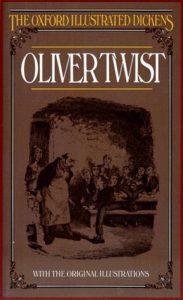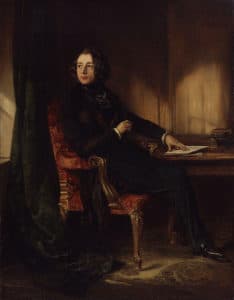Oliver Twist is one of the best known works of Charles Dickens, mostly thanks to the movie adaptation Oliver! (1968). I had never read it until last month, and I ended up … surprised.
It’s not one of Dickens’s better novels.
Oliver Twist is the story of an orphan, born illegitimately (a shocking enough notion for early Victorian literature). His early years are spent in a workhouse run by incompetent and sometimes venal caretakers. He’s “sold” to a coffin maker; the practice of selling (officially, “apprenticing”) orphan children was common at the time. He runs away to London, and falls in with a criminal gang led by the miserly Fagin. The gang includes the Artful Dodger, John Dawkins; the vicious Bill Sikes; the thief Charley Bates; Toby Crackit, a burglar; and the thief Nancy, Sikes’s lover, who will die for trying to save Oliver.

The story was serialized monthly in Bentley’s Miscellany from 1836 to 1837, with illustrations by George Cruikshank. It overlapped the serialization of Pickwick Papers by 10 months, so, to be fair to Dickens, Oliver Twist and Pickwick were being written and published at the same time. And Dickens was serving as editor of Bentley’s, in addition to other writing activities. This was also Dickens’s first official novel, Pickwick being more a series of related short stories. We find that Oliver disappears for fairly extended stretches of the work, and Dickens had to do some concentrated plot advancement toward the end of the book. Later, Dickens would take to planning his serialized novels, but Oliver Twist is one that developed rather organically.
No, it is not one of his better novels. That said, it does contain much of what makes Dickens’s novels the enduring works that they are.

In a famous scene, Oliver asks for more gruel.
Even at this early date, Dickens was demonstrating a genius for scene description that puts the reader right smack into the narrative. We are in-the-room witnesses to Oliver’s birth. We experience what he did in the workhouses and the coffin maker’s business. We find ourselves cringing at walking through London’s slums and Fagin’s criminal den. Many critics have pointed out that Dickens had a photographic gift for scene description; photography as a new art was just getting started at the same time (Dickens himself didn’t like the official photograph portraits taken of him throughout his life).
Surprisingly, the scene in the book that Dickens would become most famous for—the acting out of the murder of Nancy by Bill Sikes, a performance that caused screaming and fainting in his audiences—is relatively subdued in the book. Or perhaps the modern reader is more jaded to violence.

Dickens in 1839 by Daniel Maclise
Dickens also demonstrates in Oliver Twist a genius for his character descriptions. His vivid words for describing Fagin, for example, would eventually lead to charges of his being anti-Semitic. While he was more likely reflecting the prejudices of the time, he would, in later editions of the book, remove the repeated second references of Fagin from “the Jew” to “the old man.” But all of his descriptions make the reader see the characters as real people, down to their clothes, mannerisms, and facial expressions.
Oliver Twist was written and published at a time when the young Charles Dickens (all of 24) was in the first flush of public success. His articles, collected under the title of Sketches by Boz, had been widely popular. The serialized Pickwick Papers was a sensation, with the sayings of one of the characters, Sam Weller, becoming famous throughout Britain and beyond. As he was finishing Oliver Twist, he was already on to the next serialized novel, Nicholas Nickleby.
No, Oliver Twist wasn’t the best novel Dickens wrote, and it could have been more tightly constructed. But it was full of the promise of what would come later.
Related:
“David Copperfield”: Why Charles Dickens Has Endured
Photo by Padmanaba01, Creative Commons, via Flickr. Post by Glynn Young, author of the novels Dancing Priest and A Light Shining, and Poetry at Work.
__________________________

“I require all our incoming poetry students—in the MFA I direct—to buy and read this book.”
—Jeanetta Calhoun Mish
- Stephen Foster: How Song Opened a Door on History - August 26, 2025
- Poets and Poems: Four Collections by Erin Murphy, Part 2 - August 21, 2025
- Poets and Poems: Four Collections by Erin Murphy, Part 1 - August 19, 2025

L.L. Barkat says
24?
Oh my. 🙂
I’ve never read the book, but I did quite enjoy your summary of it—and of what it revealed of Dickens’ strengths as a writer.
I think it should be an encouragement to all of us that even Dickens had to start somewhere. Sometimes we forget that, looking only at the eventual success of writers whose careers we may wish were our own. (Personally, I’m happy being the publisher, but I think even publishers can be encouraged by considering the journey of authors like Dickens. 🙂 )
Glynn says
At this point in his writing career, Dickens was writing “organically,” and letting the story go where it seemed to want to go. He was ferociously busy — completing the last installments of Pickwick, starting Oliver twist, writing other articles. Later, he would plan the novels — what today we would call an extended outline. And it paid off — consider David Copperfield and Great Expectations.
But even in the lesser novels, his eye for description is astounding.
Maureen says
I have read ‘David Copperfield’ and ‘Great Expectations’ but, I admit, not ‘Oliver Twist’. Nicely balanced review of it here.
Glynn says
Thanks, Maureen!
Bethany Rohde says
I remember liking Oliver Twist, but it has been about 20 years since I read it. I think what drew me to it then was my concern for dear little Oliver—this sensitive, seeing soul out there with the wolves. I wanted to protect him myself. (If only readers could!)
Glynn says
Dickens had a way with children – Pip in Great Expectations, Little Nell in The Old Curiosity Shop, even David in David Copperfield.
Monica Sharman says
David Copperfield, Oliver Twist … and now, Glynn, I will be waiting to read your article on The Tale of Two Cities. 🙂
I enjoyed reading this. My 12-year-old and I just finished Oliver Twist as a read-aloud.
Glynn says
Next will be either A Tale of Two Cities or Great Expectations. I haven’t read either since 9th grade.
Bethany R. says
I remember being quite struck by A Tale of Two Cities when I was in 10th grade. (Will I be surprised by it now? ;))
Megan Willome says
“Oliver Twist” was the first Dickens book I read. I think I was about 12, like Monica’s son. I loved it, mainly for the characters. They are unforgettable.
P.S. Can’t believe you didn’t mention the musical version. Nancy singing, “As Long As He Needs Me.” Oh, man.
Glynn says
The musical, particularly the movie version, is likely better known than the book.
Sandra Heska King says
That Dickens was so young when he wrote this AND Pickwick Papers (my first intro to that was in Little Women) AND was an editor kind of blows me away.